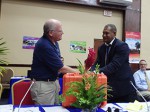The International Whaling Commission (IWC) and the Secretariat of the Pacific Regional Environment Programme (SPREP) agreed on a partnership on whale conservation and welfare in the Pacific region at a ‘Year of the Whale' side event that took place at the margins of the 25th Annual Meeting of the Pacific Regional Environment Programme in Majuro, the Marshall Islands.
 1 October 2014: The International Whaling Commission (IWC) and the Secretariat of the Pacific Regional Environment Programme (SPREP) agreed on a partnership on whale conservation and welfare in the Pacific region at a ‘Year of the Whale’ side event that took place at the margins of the 25th Annual Meeting of the Pacific Regional Environment Programme in Majuro, the Marshall Islands.
1 October 2014: The International Whaling Commission (IWC) and the Secretariat of the Pacific Regional Environment Programme (SPREP) agreed on a partnership on whale conservation and welfare in the Pacific region at a ‘Year of the Whale’ side event that took place at the margins of the 25th Annual Meeting of the Pacific Regional Environment Programme in Majuro, the Marshall Islands.
The Oceania humpback whale population has become a conservation success story through its recovery from near-extinction status, IWC Technical Adviser, David Mattila told participants. He said an assessment of data collection by the South Pacific Whale Research Consortium shows the humpback whale is now on a trend towards recovery, but highlighted new threats faced by the species, including entanglement in fishing gear, such as gill nets, lobster pots or longlines, and other marine debris. Mattila explained that more than a quarter of humpback whales have scarring on their bodies that indicates they have become entangled in gear.
Mattila also described IWC training on how to safely disentangle whales, which IWC conducts for both members and non-members. IWC has provided Tonga and Vanuatu with specialist equipment that is used to disentangle whales.
SPREP Members expressed enthusiasm in participating in whale conservation activities at the meeting, including investigations on whale migration routes, the responsible management of whale watching and climate change impacts. Participants suggested, inter alia, further training on managing whale entanglements and standings. Participants also discussed ideas for the proposed ‘2016-2017 Year of the Whale’ in the Pacific island region.
Several SPREP Member countries have declared whale sanctuaries in their waters and encouraged research projects on humpback whales, which migrate between breeding grounds in the Pacific and feeding grounds in the Antarctic Ocean, according to SPREP. Humpback whales are also a tourist attraction in the Pacific; in Tonga, the humpback whale tourist industry is estimated at US$5 million, according to SPREP. [SPREP Press Release] [IWC Website] [IISD RS Story on Humpback Whale Research]